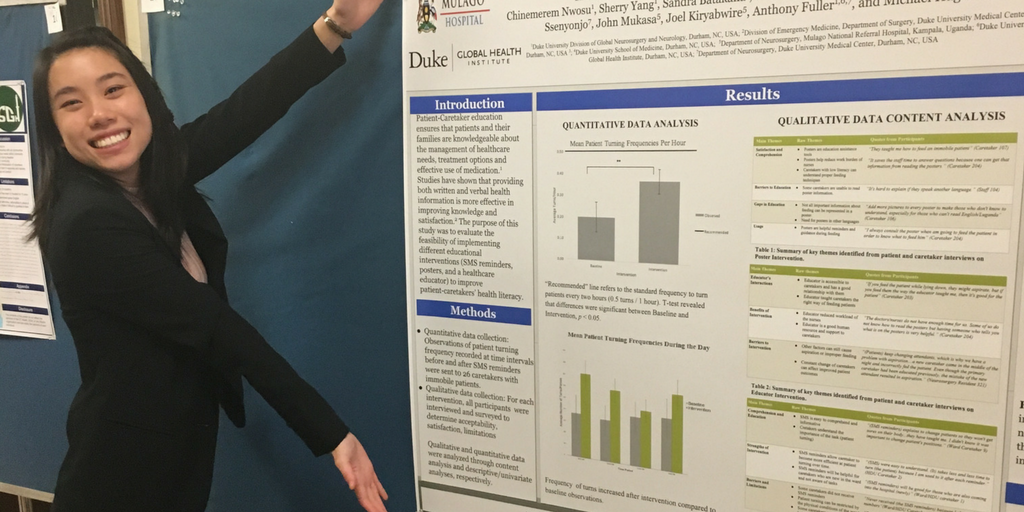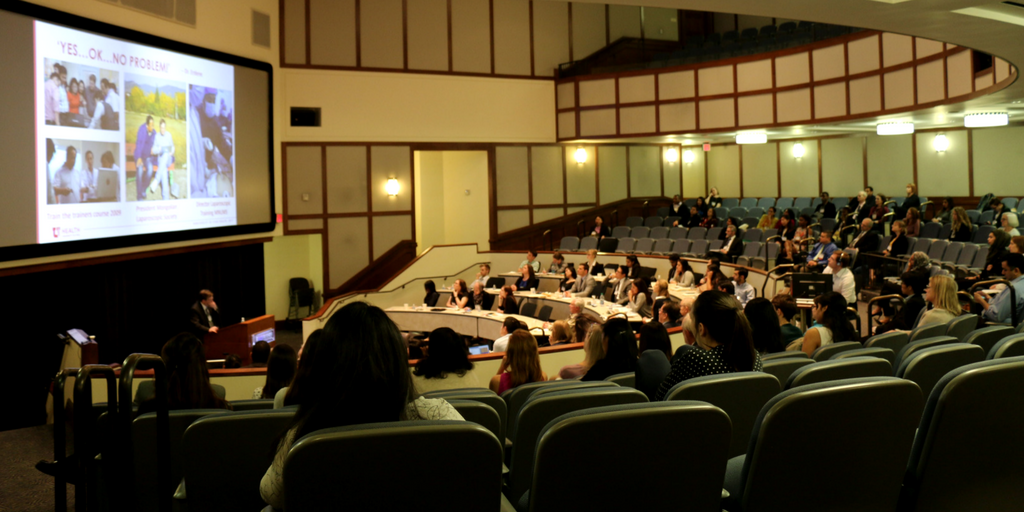Intention Versus Impact: Reflections on the GLOCAL 2018 Global Health Conference
April 4, 2018

Two undergraduate members of the Bass Connections Interventions Improving Neurosurgery Patient Outcomes in Uganda team traveled to Rice University in Houston to present their research at the GLOCAL 2018 Global Health Conference.
Chinemerem Nwosu ’19 (Program II: Determinants of Health Outcomes in Africa) and Sherry Yang ’19 (Neuroscience) presented their poster “Evaluating the Feasibility of Multi-Modal Educational Interventions to Improve Patient-Caregiver Health Literacy in Mulago Hospital Neurosurgical Ward, Uganda,” and attended talks on the theme of “global is local.”
Yang shared this reflection. (Read Nwosu’s insights here.)
By Sherry Yang ’19

This past summer, our Bass Connections team traveled to Kampala, Uganda, to continue our research at the Mulago National Referral Hospital (MNRH) neurosurgical ward. In partnership with Duke’s Division of Neurosurgery and Neuroscience (DGNN), we evaluated the feasibility of multi-modal educational interventions, including mobile health (mHealth) applications, to improve the health literacy of patient caretakers.
Our results revealed promising potential for mHealth in a low- and middle-income setting. Upon returning to Duke, we submitted an abstract to the 2018 GLOCAL Conference in Houston, TX, to talk about our research. Fortunately, our abstract was accepted, and in the beginning of March, we had the chance to present our research to interdisciplinary professionals with a passion for global health innovation and advancement.
Since my time in Uganda, I’ve found myself constantly searching to separate impact from intention. Why do well-intentioned global health trips often negatively impact foreign communities? What can I do to ensure that our research is both ethical and beneficial in the long term? I reflected about this more at the conference.

One speaker, Dr. Serag, articulated that many public health problems stem from a desire to quickly fix an issue. Policies and research proposals commonly attempt to tackle the symptoms, but not the root cause. These well-intentioned policies and proposals neglect the social determinants of health. Strategies emphasize food supplements, but not security. Programs focus on female education, but not empowerment. Instead, we must strengthen foundational health systems to create positive and sustainable impact. Chasing symptoms is simply not enough.
The conference was centered on the theme that global is local. Crises are not only occurring on other continents, but also in our own backyard. One speaker, Dr. Pearson, is a pediatrician at a local hospital with a large refugee population. She mentioned that her official Pediatric Handbook advises parents to conduct monthly fire drills and avoid feeding infants certain types of fish. Yet, when she asks parents what they are most worried about, most talked about their fear of safety and deportation. In these moments, do “certain types of fish” really matter?
To make a positive impact, we must understand what the community needs. Another speaker, Dr. Schuler, talked about his experience with implementing a solar-powered device globally. At first, his team made a solar stove for Haitians, but the women hated it. Cooking was typically an indoor social event for women; however, the stove required women to cook outside, segregate and use unfamiliar tools. He compared the project to fitting a square peg in a round hole – a forced innovation that neglected to consider Haitian cooking traditions. For lasting impact, we must understand the context of our innovations and meet users where they live.
GLOCAL has taught me that sustainable, positive change is possible. We must not let the fear of bad change stop us from making any change. The key to positive impact is communication. By establishing a lasting partnership, creating trust and understanding community needs, we can supplement good intentions with positive impact.
Learn More
- Join us at the Bass Connections Showcase on April 18.
- Check out Bass Connections in Brain & Society teams at the Duke Institute for Brain Sciences (DIBS) Discovery Day on April 15.
- Browse stories from students on their Bass Connections experience.
